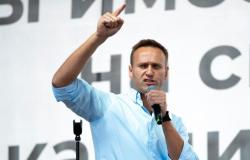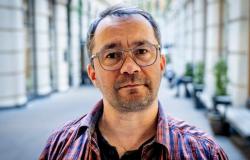A week ago, Vladimir Putin emerged as the triumphant victor at the election vigil after he won the presidential election with what was reported to be more than 87 percent of the vote.
To chants of “Putin, Russia, victory” from jubilant supporters, he coolly dismissed Western criticism of the election as neither free nor fair.
This weekend it was a very different and subdued Putin who addressed a nation in shock after the massacre at a rock concert on the outskirts of Moscow.
The image he has built up of himself as a tough leader was dealt a heavy blow by a few armed men mowing down concert-goers without the police or security preventing it.
Watch video: Compared to Disney villains
Blame Ukraine
On TV on Saturday, the day after the attack, he tried to turn the terror to his own political advantage by suggesting a connection between the perpetrators and Ukraine. He said they were arrested on their way to Ukraine, but he did not mention IS, which had already claimed responsibility for the attack the night before.
The article continues below the adThe article continues below the ad
Russian hawks responded to the attack by demanding that the Russians go even harder – but against Ukraine, not against extremist threats.
Konstantin Malofayev, owner of an ultranationalist website, called on the Kremlin to give Ukrainians 48 hours to leave all major cities before a massive attack, while Aleksandr Dugin called for full mobilization to “liberate” Kyiv and other Ukrainian cities.
– No time for real threats
The opposition, for its part, points to what they call Putin’s broken promise of security after the attack. They accuse the security forces of being too busy hunting down Kremlin critics to have time to deal with real threats.
The article continues below the adThe article continues below the ad
One of the suspects in the attack in Moscow sits in the courthouse after being arrested. Photo: Aleksander Zemlianichenko / AP / NTB
Many are wondering how Russia’s powerful security apparatus was unable to avert the deadliest terrorist attack in Russia in two decades, even though Western intelligence had warned and shared information with the Russians about a possible attack weeks before.
The article continues below the ad
They also wonder how the attackers could carry out their deadly mission and leave the scene without the police intervening. They were only apprehended the next day, hundreds of kilometers away.
– What is striking is the catastrophic incompetence of our security services, says Ivan Zhdanov, former head of the anti-corruption foundation of the late Alexei Navalny.
War and terrorist attacks
Such accusations of intelligence failures could hurt Putin, the former KGB spy and head of the FSB security service.
He came to power on New Year’s Eve 1999 while presiding over a brutal war in Chechnya. He blamed the Chechens for a series of bombings of apartment blocks in Moscow, which others believe was a false flag operation to boost support for the war.
During his first year in power, several major terrorist attacks occurred, including the storming of a Moscow theater in 2002 in which rebels took 900 hostages, and the siege of a school in Beslan in 2004 in which over 300 people, mostly children, were killed .
The article continues below the ad
Stepped up the suppression
Such attacks became less frequent in recent years as Ramzan Kadyrov used his feared security forces to stabilize Chechnya, and as Putin slowly but surely curtailed civil rights and stepped up repression of the opposition. He claimed it was necessary to tackle the terrorist threat.
The article continues below the ad
Putin’s opponents accuse him of using the massive police and security forces to suppress political opponents, human rights groups and LGBT activists while leaving the country open to armed extremists.
– For decades we have been told that the restriction of our rights is necessary for security, Zjdanov says on his Telegram channel at the weekend.
– But the terrorist attacks do not stop, and the FSB is busy with everything other than what they are directly responsible for, such as killing political opponents, spying on citizens and prosecuting anyone who opposes the war, he says further.
The article continues below the ad
Ignored the warning from the US
Russian authorities had not yet commented on Sunday that IS claimed responsibility for the attack in several videos in which they describe how they proceeded, and say the attack is part of the fight against countries that suppress Islam.

Search crews search the ruins of the burnt-out concert hall in Moscow after Friday’s attack. Photo: Russia’s Ministry of Crisis / AP / NTB
After the attack, a warning from the United States two weeks before has received a lot of attention. On March 7, the US Embassy in Moscow said it was “monitoring reports that extremists have immediate plans to attack large gatherings of people in Moscow, including concerts.”
In a speech to FSB chiefs on Tuesday, three days before the attack, Putin called the warning provocative and “blackmail aimed at intimidating and destabilizing our society.”
– Ukraine most important
While praising the FSB’s anti-terror efforts, he emphasized that the service’s most important work is related to the so-called military special operation in Ukraine, and revolves around hunting down pro-Ukrainian sabotage groups.
The article continues below the adThe article continues below the ad
After the attack, Putin’s critics say the focus on spying on them and harassing them has left Russia vulnerable to real attacks.
– They are unable to do anything useful, they only protect the criminal regime against its own citizens, and not the citizens against the criminals, says Dmitry Gudkov, former parliamentarian and now opposition member.
More and more “terror” trials
Putin has always portrayed the intelligence and security services as elite operations, and over the years the Kremlin has used them to crack down on its main political opponents, who are called terrorists and extremists.
Last year, 143 trials for terrorism were started, according to the online newspaper Mediazona, while there were fewer than 20 in the years 2012 to 2017.
– There are many cases of preparation for terror, including cases that are completely fictitious, says editor-in-chief Sergej Smirnov.
The article continues below the ad
The FSB has also been involved in a number of cases of poisoning opponents, including Navalny and Vladimir Kara-Murza in Russia, and the former spies Sergei Skripal and Aleksandr Litvinenko abroad.
In the last five years, the authorities have issued 141 indictments for criminal activity against Navalny’s associates, says his former chief of staff Leonid Volkov on Telegram.
– The FSB likes to invent non-existent terrorists. So then there won’t be enough time for the real terrorists, says Volkov, who himself was attacked by a man with a hammer in Lithuania, where he lives in exile. He believes Putin’s henchmen were behind it.
– Then it cannot surprise anyone that the FSB cannot do the only job they were supposed to do, namely to prevent a real, nightmarish terrorist attack, he says.
Tags: Moscow attack damages Vladimir Putins reputation toughness
-





